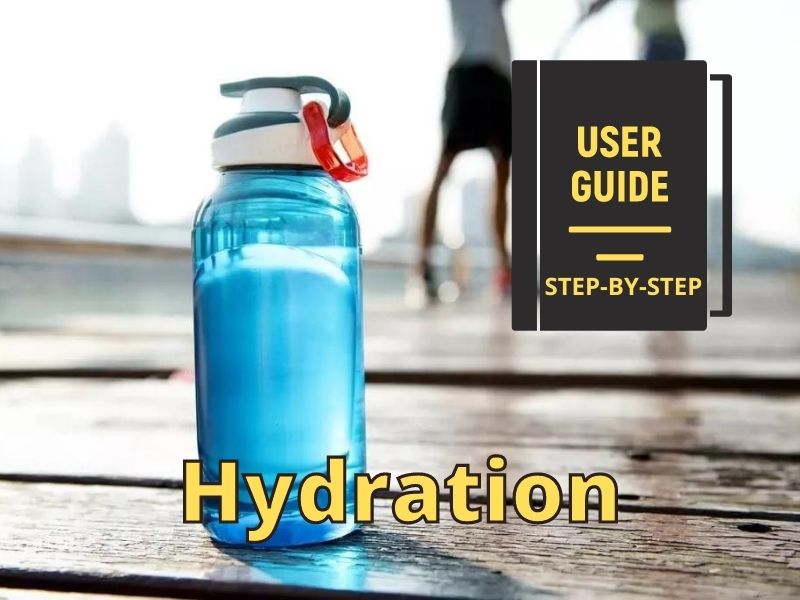There is no doubt that drinking the right amount of water per day will benefit your body and health maintenance, and many other health-related benefits. I love the taste of water, although I know many people may not; hydration can really make all the difference when exercising.
Hydrating will provide the appropriate amount of water your body needs during exercise and normal daily activities. It will facilitate temperature regulation, energy levels, exercise performance, and recovery.
Sometimes I realize I am tired because I have only been drinking a bottle of water each day. My body needs more water to get appropriately hydrated. We can eat more water-filled foods and drink sports drinks at times, but water is going to be most effective at hydrating your body.
Summer is here so we will have many opportunities to stay hydrated. We’ll discuss the benefits, dangers, and information you need to know about regarding hydration and dehydration, before, during, and after exercise.
What is Dehydration?
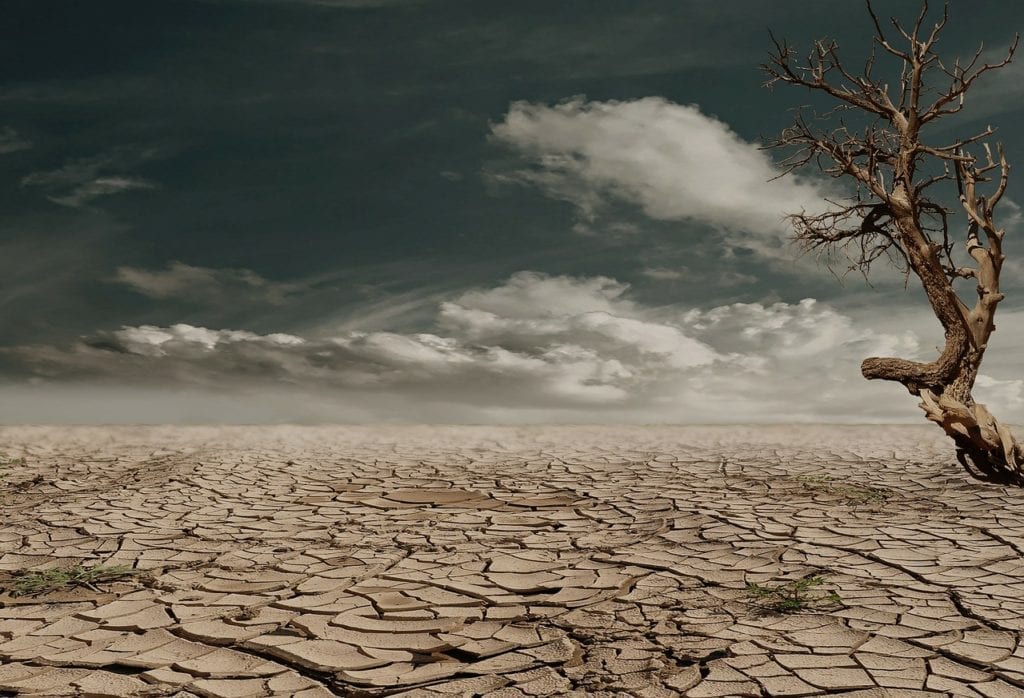
The human body needs water in three main places: The intracellular spaces (inside the cells), interstitial spaces (the space between cells), and the intravascular or extracellular spaces (around the blood vessels).
All three spaces must have a good balance of water volumes otherwise your body will struggle to perform optimally. But then, your body must excrete some of this water when removing body waste, necessitating regular refilling. If your water intake is less than your body’s water loss within a specified duration of time, that leads to dehydration.
Although dehydration can result from many health factors such as prolonged diarrhea, diabetes, and vomiting, sweating due to working in hot climates or strenuous body exercises is known to be the single most prevalent cause of dehydration. This is because your body uses sweating as its cooling mechanism whenever it heats up.
How will you tell if your body is dehydrating/dehydrated during or after exercise?
- A heightened thirst level is your body’s way of telling you to increase your water intake.
- Decreased urine output, sweat volume, amount of saliva, and tearless eyes are all signs that your body is dehydrated and is trying to conserve the little remaining water.
- Lightheadedness, body weakness, and vomiting indicate that your brain, heart, lungs, kidneys, and intestines are not getting enough blood flow due to dehydration.
- Other symptoms include muscle cramps, increased heart rate, and heatstroke. We will look at all these in more detail later in this post.
Reasons to Stay Hydrated Before and During a Workout
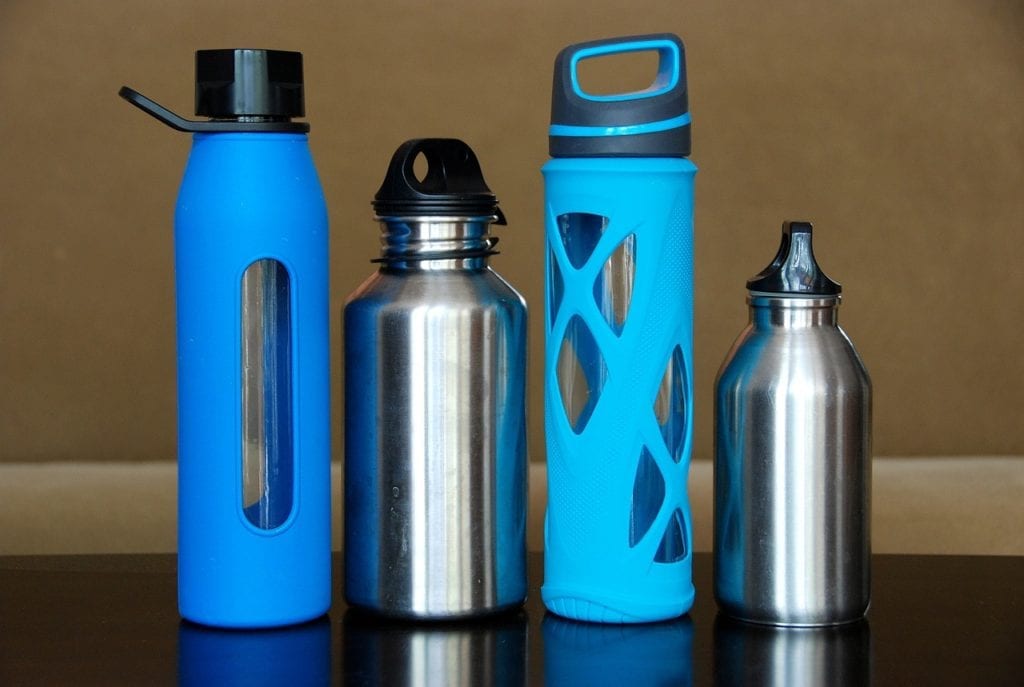
Because the human body is made of 60-75% water, every tissue or organ on our bodies must be well hydrated for it to survive and function. Whether you exercise a lot or you don’t exercise at all, not drinking enough water per day can adversely affect your health and cause unwanted weight gain.
Besides, your body loses tons of fluids every day through sweating, breathing, and the inevitable calls of nature. And the more you take part in vigorous physical activities, the more fluids you lose.
There are many more reasons to stay well hydrated before and during exercise. Some of them include:
1. Keeping Your Core Body Temperature in Check
Because over 75 percent of the energy you put into exercise is converted into heat, you need a way of maintaining your core body temperature within manageable limits.
Taking a sip of cold water at least every 15 or 20 minutes during your workout is a good option in this regard. It allows you to exercise longer without getting fatigued.
And even though any water temperature is fine when working out (after all, constant rehydration is the bottom line here), but cold water is more refreshing; it cools you off a bit better than lukewarm water. If you exercise in heat and humidity, cold water would probably be your best bet.
2. Preventing Muscle Cramps
If you are yet to experience it, a muscle cramp feels like a sledgehammer knock to the leg. Believe me, the intense pain that comes with it is the last thing anyone would wish even to their worst enemy. Some athletes experience these crams more often than others depending on their level of endurance to intense workouts.
Cramps result from dramatic shifts in the fluids that reside in and around the muscle cells, mostly due to a sudden decrease in the fluid outside of the cells.
You will be happy to know that multiple studies on body fluids and cramps have proven that staying hydrated throughout an intense physical activity can reduce the frequency of muscle cramps or even eliminate them completely.
3. Preventing Heatstroke
Dehydration increases muscle fatigue and exhaustion which, consequently, reduces your workout performance. How so? By gradually reducing your heart’s pumping power such that the amount of oxygenated blood leaving your heart keeps declining heartbeat after the other.
This leads to less energy production, oxygen-deprived muscles, and if you are working out with the sun beating down on you, it can cause heatstroke.
4. Dehydration Causes Unwanted Strain on Your Heart
Your heart needs to be hydrated at all times for it to function properly. If your body loses more water than you are drinking, which is prone to happen during workouts, your heart starts to pump smaller volumes of blood per heartbeat. That means that it has to beat at a faster rate in order to meet the required 2,000 gallons of blood a day.
And as if that’s not enough, dehydration leads to excessive depletion of sodium and other salts in your body which forces your heart to strain even more when pumping blood. This straining can cause heart palpitations and in some severe cases, life-threatening cardiovascular problems.
5. Dehydration Makes You More Sensitive to Pain
This will sound like a cliché but, honestly, there is no gain without pain in the gym. The higher your pain threshold, the more you feel like you can exercise longer.
But according to a 2014 study by Japanese scientists, dehydration affects the part of the human brain that deals with pain issues, consequently raising its sensitivity to pain.
6. Fluid Deprivation Lowers Your Levels of Vigor and Alertness
Exercising requires you to either wake up early or spare some time after work to hit the gym. This translates to tighter workday schedules which, in turn, may necessitate higher levels of vigor and alertness all day long.
If you are dehydrated, however, your body will always feel fatigued and unwilling to exercise. And even when you push yourself to do it, you could be risking injuries that arise from handling gym equipment without being 100% alert.
7. Cushioning and Lubricating Your Fragile Organs
Water surrounds and cradles your spinal cord, acting as its protective cushion during vigorous body exercises. Adequate water intake also helps in lubricating your joints.
That keeps them comfortable, stable, and less vulnerable to chronic joint pains. That allows you to work out without jeopardizing your health.
The Importance of Rehydration after Exercise
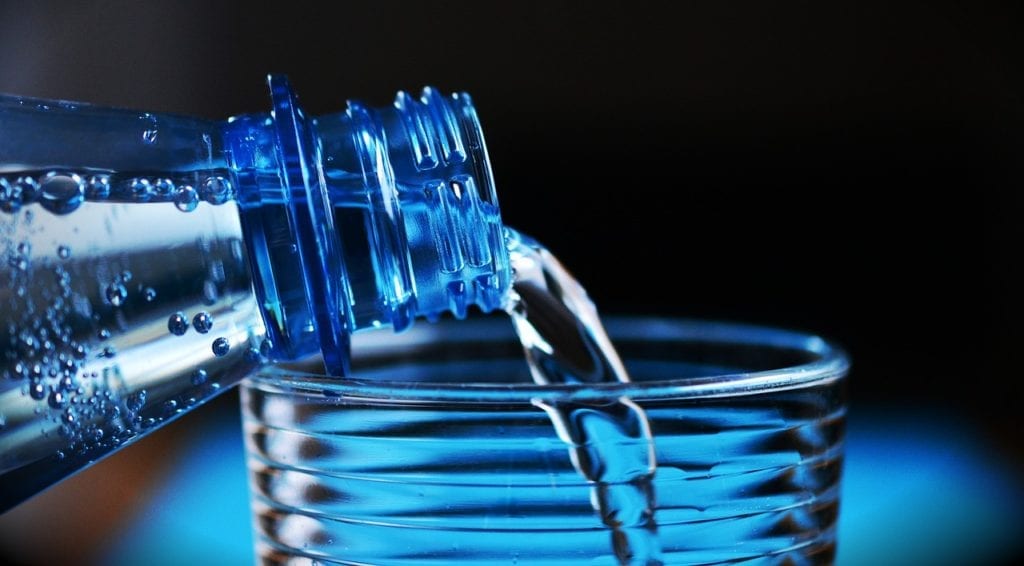
It is pretty normal to have some dehydration during and after a workout, so being aware of your water needs will help you rehydrated your body properly.
Experts say that within the first six post-workout hours, an average-sized adult should take at least 1.5 liters of recovery fluids for every kilogram of bodyweight he/she loses. This shows how crucial post-workout hydration is to your recovery.
Here are 5 ways that post-workout hydration will boost your recovery and help you increase the effectiveness of your subsequent exercises.
1. Aiding the Digestion of Vital Nutrients
This goes without saying: A thorough workout session leaves your glycogen reservoirs and your entire body begging refueling and recharging. Your body needs enough nutrients to boost the recovery process. This is the time when you need your digestive system to be at its very best. But how can it perform to perfection without adequate hydration?
Drinking enough water before your post-workout meal will expedite the digestion of vital nutrients. It helps your body to replenish the saliva that dried up during the intense exercise. And, of course, saliva is vital in the processes of breaking down food and absorption of nutrients.
2. Replenishing Lost Electrolytes and Fluids
Replacing the fluids that your body lost through sweating is probably your number one priority. That is a very thoughtful thing to do. But do you do the same to the potassium, sodium, and other body salts that the sweat carries along? Taking in enough fluids will achieve both.
Besides water, you will replenish your lost electrolytes and fluids by drinking fruit juices and sports fluids or by eating water-filled foods such as watermelon, pineapples, oranges, and grapes.
Bonus tip: Bananas and potatoes may not have a lot of water but they are rich in electrolytes.
3. Faster Heart Rate Recovery
Particularly if you work out in the hot summer months, the stress that your heart experiences can be harmful when dehydrated. But the good news is that athletes who rehydrate sufficiently during and after intense workouts report significant heart rate recovery.
4. Enhanced Muscle Protein Synthesis
Protein synthesis is responsible for rebuilding your muscles after they are broken down by an intense workout. And don’t get it twisted: Breaking down muscles is not a bad thing per se; that is how your body transitions into your ideal size and shape.
But protein synthesis requires the muscles to be sufficiently hydrated for it to work effectively. Otherwise, your recovery process will be extremely sluggish.
5. Curbing Fatigue
We already mentioned that sipping water during your workout can help you to exercise more without feeling fatigued. Well, this works even after you’re done, this time minimizing the feeling of fatigue and lethargy so that you can rest and sleep better at night.
How to Manage Hydration for Your Exercise and Recovery
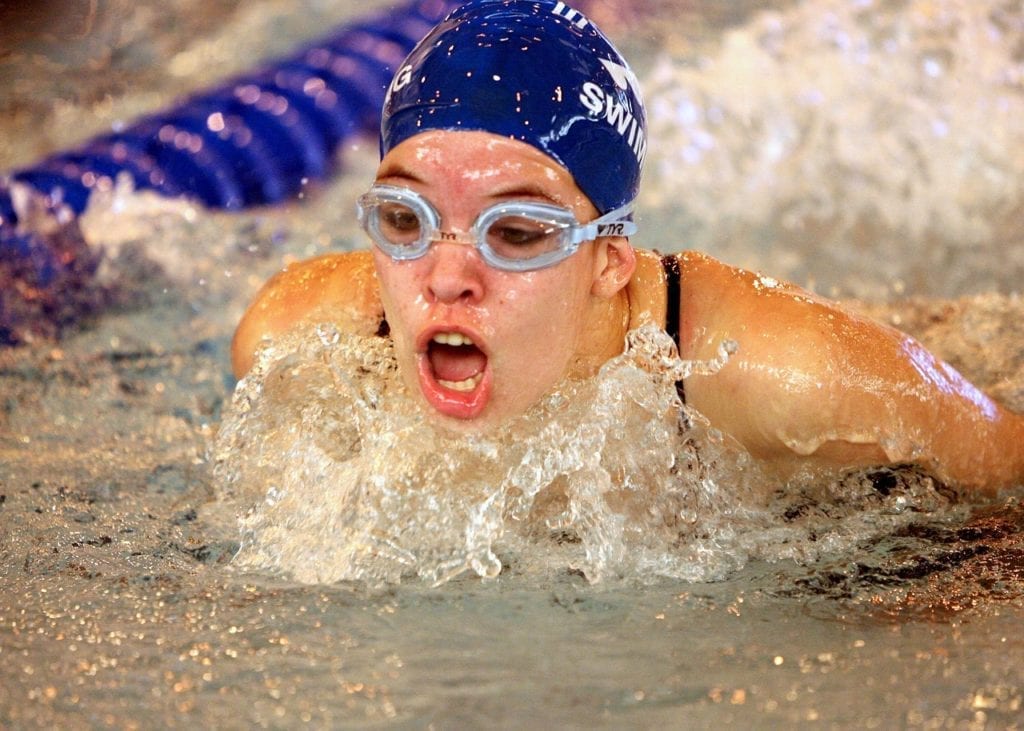
Knowing the right amount of fluids your body needs for a given exercise duration, which types of fluids to drink, and at what time to drink them is equally as important as the physical part of the workout.
One simple miscalculation can result in your body not performing at its peak. How, then, can you manage hydration for your exercise? Here are 6 tips for you.
• Is your urine dark yellow or amber-colored? Drink up.
A well-hydrated person should have a pale yellow to clear urine. If yours is turning to dark yellow, you may need to drink some more water or sports drinks before starting your workout session.
While exercising, avoid the sports drinks that contain high levels of sugar and/or sodium, or those that contain caffeine.
Consuming sugar during an exercise is counterproductive, while caffeine has a diuretic effect on the human body, meaning that you will be losing a lot of fluids by urinating more often, defeating the whole purpose of drinking more fluids.
• If you are exercising for less than 90 minutes, you don’t need sports drinks.
Because most sports drinks contain too much sugar and carbs, it is good to only use them when working out for long hours.
These drinks are only necessary when your body needs to replenish its carbohydrates and sodium stores after a long, strenuous exercise. If you are just going for your normal 1-hour workouts, drinking water is just fine.
• Sipping on small amounts of water is better than slamming down large mouthfuls.
This might sound like a tall order for you, particularly because your body feels too thirsty- hungry actually- for tons of water during an exercise.
But don’t let that thirst fool you; what your body actually needs are small sips of water so that it can absorb them faster and easier. Unless you’ve been dehydrated for a while, then rehydrating before any intense exercise would be a priority.
Also, your body doesn’t have the ability to retain too much water in one go. Slamming down large mouthfuls of water, therefore, means that you will need far too many bathroom breaks within one session.
• Be on the lookout for key signs of dehydration.
If you feel thirsty during a workout, that is a sign that you are getting dehydrated. Dry eyes or blurred vision, lightheadedness or delirium, and muscle cramps are also reliable indications of dehydration.
If you notice any of these, drink up before it is too late. And just like we mentioned earlier, the color of your urine will always tell you how good or poor your hydration levels are. Don’t shy away from checking that out once in a while.
• Your sports drink needs to have optimal levels of carbohydrates and sodium.
When the need for a sports drink arises, it is important that you ensure that it is one that will help you recover properly. It should have electrolytes and possibly carbohydrates.
If you are buying a sports drink from a store, then all you need to do is check out the bottle label and see if the sugar levels are low and it has sodium. It can have other ingredients that help your body like potassium, magnesium, and vitamins.
If you are planning on running long distances or doing an intense activity for a period of time, getting a sports drink with more sugar is probably a good idea, since your body and use it immediately.
However, the recommended amount of carbs per 16 oz of any sports drink should be 20-30 grams, during intense exercise. The concentration of sodium, potassium and other electrolytes varies depending on your hydration needs, humidity, and workout duration, but it should range between 0.2-0.3 grams per 16 oz.
Tip: If your budget is tight, combining 1 cup of water with 1 cup of pure fruit juice and adding a 1/8 teaspoon of table salt will also work as a sports drink.
• Prioritize pre and post-exercise weigh-in.
We mentioned earlier that you should take about 28 oz of recovery fluids for every pound of body weight you lose. And what better way to know how much weight you have lost in an exercise than to weigh yourself before and after the workout and then get the difference between the two weights?
Maybe the resulting figure will not be the exact weight loss, but at least it will give you a pretty close estimation. If you find this to be a bother, then ensure that you drink enough water to quench your thirst after every workout, then drink some more.
• Use a smartphone or watch app.
Sometimes we don’t feel dehydrated because the mechanism that tells us we are thirsty no longer works in the same way it used to. We’ve become used to ignoring it and drinking less water.
This is when a smartwatch or phone will come in handy. It helps us restore our hydration levels to normal. This can also help us restore the mechanism that helps us know when we are thirty.
To see if you’re drinking enough, take your weight and divide by 2. So if I weigh 180 lbs I should drink approximately half that in ounces – 90 oz.
How Much Water Should You Drink While Exercising? Can You Drink Too Much?
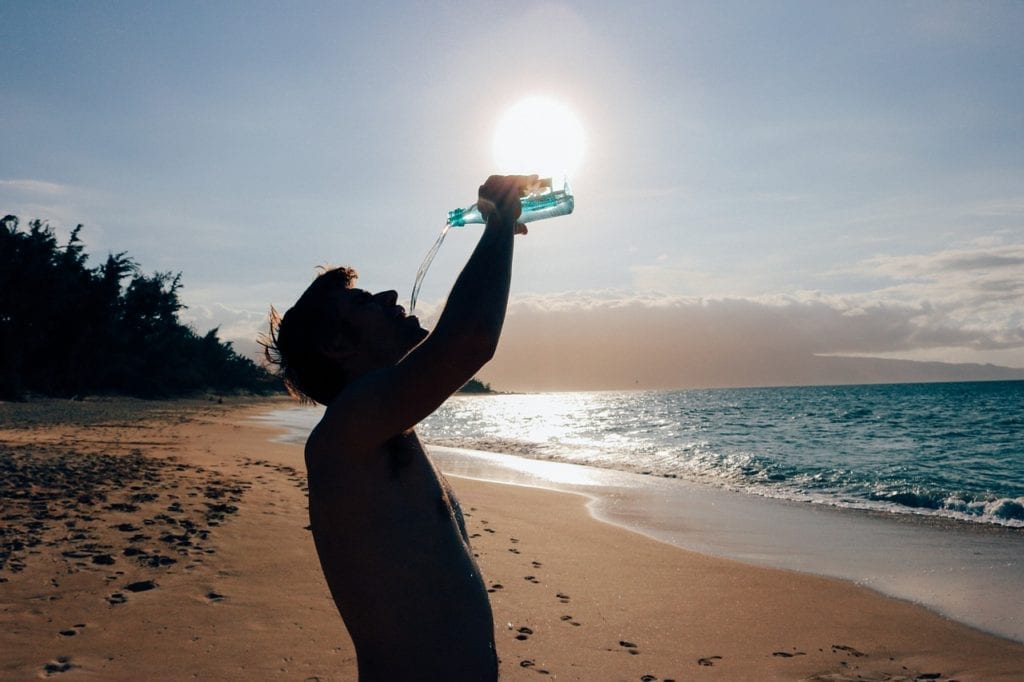
Your perspiration rate depends on your gender, age, body size, the temperature under which you exercise, workout intensity, duration of exercise, and your fitness levels among other factors.
That means that you cannot predict for sure how much water you will need for your exercise, and you definitely cannot compare your hydration needs to anyone else’s.
That being said, The American Council on Exercise has set the following 4 guidelines that should help you to manage your hydration process before, during, and after a workout.
- Drink at most 8.5 oz of water about 30 minutes prior to your workout session.
- In total, drink about 16-20 oz of water within 2-3 hours of your next exercise.
- During the exercise, make it a point of sipping about 5 oz of water over a period of 10-20 minutes.
- After your exercise, ensure that you drink at least 8.5 oz of water within the first half-hour.
Drinking excessive volumes of water when exercising can be more dangerous than dehydration. Research shows that over-hydration can result in water intoxication or Hypernatremia, a condition where the electrolytes in your bloodstream get dangerously diluted.
Although not common, this condition is known to be fatal and can lead to death. The symptoms of over-hydration are almost similar to those of dehydration so if you notice that the color of your urine is getting darker with every cup of water you take, chances are that you’ve had too much to drink.
Note that all athletes are prone to suffering from this condition, but you are at a higher risk if you are diabetic or if you have any underlying kidney problems.
As a matter of fact, you don’t have to drink too much water to suffer from over-hydration; sometimes it will precipitate from your body’s inability to get rid of water properly.
In such a case, taking diuretics to increase the amount of urine you produce can be a good remedy. If the condition persists, however, it is advisable that you see a doctor so that the condition that caused the over-hydration can be treated, especially if you start experiencing confusion and swelling of the hands and feet.
Can Drinking Water Complement Exercise In Your Weight Loss Journey?
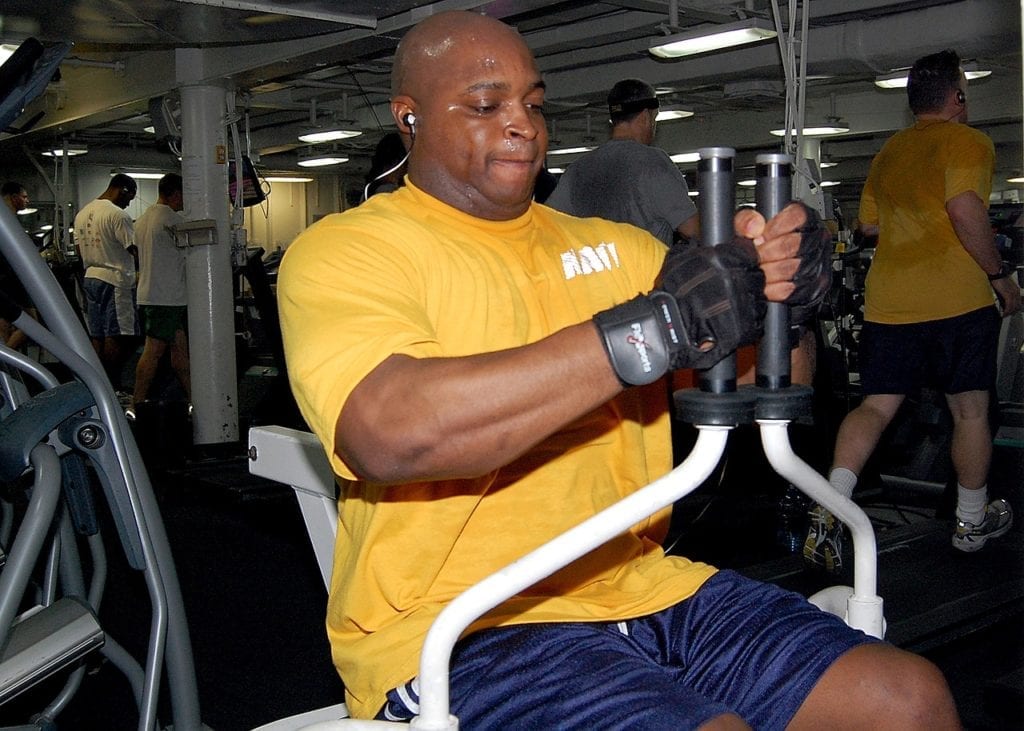
The benefits of drinking enough water after exercising are surprisingly many. If enhancing your weight loss journey is your endgame, water can benefit. Here’s how:
1. Reducing appetite
In some cases after an intense workout, people get both the false sense of starvation and the feeling of entitlement to sweetened foods and beverages. If you give in to either of the two, then you will counterproductively render your efforts in the gym useless.
Drinking water before your post-exercise meal eliminates any unnecessary appetite so that you only end up eating only the amount of foods that your body requires. It is also a great drink to have whenever you crave sugary beverages such as sodas because water is 100% calorie-free.
2. Burning more calories
Drinking cold water before a workout will increase the number of calories you burn by up to 25%. Studies show that people who drink at least 50 oz of water a day can help an obese person to lose about 8-9 pounds of unwanted body fat in a year.
Combine this with the calories you burn in your daily exercises and you will attain your desired body size sooner than you can imagine.
3. Slowing down the effects of natural weight gain
As a rule of thumb, our bodies gain weight naturally as we age. All factors held constant, the average human body gains up to 13 lbs after every 20 years.
If you drink too many sugary beverages within this period, this weight gain can shoot to 15 lbs. With regular hydration, however, the natural weight gain can be reduced to only 4-5 lbs for a whole 20 years.
Final Thoughts
Drinking enough water in the last minutes leading up to your workout is good for your hydration process, but it is also imperative that you avoid pushing your body too far.
For example, make it a routine of visiting your doctor regularly to get an expert opinion on how long your body can endure intense exercises. That will help you to keep your hydration needs within attainable limits.
You can also schedule your workouts before 10 in the morning or after 5 in the evening in order to decrease your likelihood of becoming dehydrated. And while at it, get a reusable bottle to carry your drinking water in order to conserve the environment and save on your budget.
Thanks for visiting Helpshoe.com
Additional Questions
What bottle should I use during a workout?
The best bottle works with your workout environment. At the gym or when biking you want something that is easy to access and drink out of without opening a lid. During a run, you may want a big bottle in the car and small ones to carry with you.
How long does it take to get used to drinking more water?
It will take you about 3 weeks of consistently drinking the same amount for your body to recognize your new level of hydration and consistently hold on to that water, so bathroom brakes will normalize.

